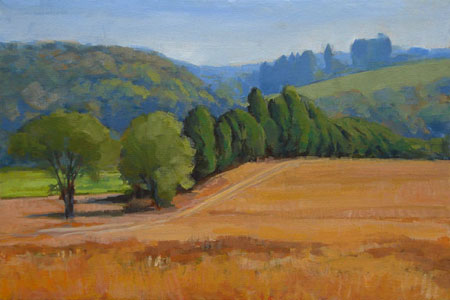
Brennen McElhaney recently asked fans on Facebook to tell him which images they preferred for greeting cards.
This got me thinking.
Do some images/styles/colors sell better as greeting cards than others?
What are you attracted to when you send a card?
Is there a correlation between what sells off the wall/from a case/from the floor and what sells on a card?
Selecting Images for Greeting Cards
- Alyson Stanfield
Share this post



31 thoughts on “Selecting Images for Greeting Cards”
I asked my newsletter subscribers to do this a few months ago and only got a few replies. Might try it on facebook too. I read somewhere that you should only make cards of images that have already sold. The thought being that the original won’t sell if they have the option of buying cards. While I understand this logic, the price points are so drastically different I dont’ know if that holds true.
As for imagery on a card, I would say simpler compositions translate better to a smaller size so the details don’t disappear. Brennan’s beautiful work is of his geographic area so popularity of a place may result in more card sales.
Casey: I would think there’s a different reason to sell images of sold work: that you know that image is desirable. It’s tested and found a market.
I don’t believe that originals won’t sell if you sell them as cards – UNLESS they’re close in price and size.
I agree Alyson, and I’ve ignored this advice with good results, but my originals are not close in price or size.
My best selling greeting cards were photos of popular flowers – daisies, sunflowers, roses,etc. Simple compositions sold better than more complex scenes. Bright colors outsold the the more subdued colors.
What sold most frequently as larger canvases and framed photos rarely sold on the notecards.
I rarely had anything that sold well in both notecards and larger sizes. I finally stopped carrying the notecards because it often took as much of my time in my booth to sell a $ 5 notecard as it did to sell a $ 100 photograph.
Good insight, Patty. Thanks for sharing that. I’m really looking forward to seeing you at the Philly workshop on 11/5.
could I get info of where to sell pictures and art for greeting cards.
Not sure what you’re asking, Jeanmarie. “where to sell pictures and art” ?
I wonder if Jeanmarie is looking for information on greeting card publishers?
Yes I am looking for info on greeting card publishers.
I loved the whole array of Brennen’s pieces. They have a warmth that makes my eyes want to linger and look again to see what I might have missed at first glance. They give me a feeling of an unhurried pace. These images all have a country-like theme going on with seasonal views. He could make a sampling of views as a boxed set, rather than having 10 cards with the same view. I personally like having a set of nice cards on hand with varied pictures.
Yes, I do, too, Ellie – I like the variety. I have a drawer full of artists’ notecards (many of them delightful gifts from clients) and I love selecting a special one with one person in mind.
What card gets sent (or given) depends on the recipient. For my brother, for example, image doesn’t matter – he’s blind. Besides, for him, it’s all about humor. The funnier the card, the more he likes it. I think the image should fit the message, of course, but once that’s defined, I, myself, love cards that are beautiful and make me smile. Those are the ones I prefer to give.
Patricia: And I like the handwritten message inside.
I sell a lot of note cards. The ones that are high sellers are generally not detailed art pieces..they are more illustrative, whimisical and high contrast, vignette style..
whether or not you choose to due it depends on your marketing goals.
that should have been
choose to do cards depends on your marketing goals.
Pam: Thank you for that insight on what sells for you.
Pingback: Selecting Images for Greeting Cards — Art Biz Blog | Free Images
I think artwork that is simpler in style would translate to a better selling card since the card is a much smaller format.
Alyson – You’re the best! Thanks for this post.
Ellie Giannelli – Thank you for your kind words! You made my day.
My question is who do you approach to buy your art for greeting cards?
Jeanmarie: I think here that we are just talking about selling cards yourself – ones that you have printed.
So do you buy your own card stock , print, and do you shrink wrap?
Yes I am looking for greeting card publishers.
Alyson, this was a timely post. The holiday season is coming up, and artists’ note cards make great stocking stuffers and grab bag gifts. So now is the time to consider what to sell and how to sell it.
I agree that simple compositions work best, unless you are using a really high end printer that has the capacity to pick up details.
Sets are a way to bypass the $5 sales. The sets look great when the cards are individually packaged and then placed in a bio-degradable clear box. Tie them with an attractive ribbon or colored raffia and they are a gift for under $25. Don’t forget to include a business card. I do hand prints and add a clear label with a thank you, my logo and contact info on the back of each card.
If you don’t want to be bothered with selling an extremely inexpensive product go the internet sales route. There are several sites where you just upload your image, select your product, set your profit over the production price, and let the site do the selling, shipping and handling.
Jeanmarie, I would recommend this for you instead of a greeting card publisher. Some of the photo printing sites have agreements with designers for greeting cards. You can also Google just about anything you are interested in doing and follow the trail from there.
Thanks again.
I think that cards that sell tend to be those that give a “feel good” message or image. I certainly wouldn’t want to send a “dark” card to anyone, and it’s too open for misinterpretation (“what exactly is she trying to tell me by sending this”).
I’ve been able to successfully sell cards made from images of my paintings. One way that I gauge the potential response has been to simply watch how people respond to the original painting. The card that was most successful was of a painting that was a little whimsical and made people smile. Because of the price difference, people were thrilled to be able to get the image on a card, even if they couldn’t afford the painting.
Pingback: Greeting Card Set | Art Working
If you’d like to see the five paintings that I selected for my greeting cards, along with a brief narrative of how it all happened, check out my blog post – “Greeting Card Set”.
Thank you Alyson for this post, and thank you all for your comments.
As to Jeanmarie’s query as to where to sell greeting card art, a great source is the website of the greeting card association. Believe it’s gca.com …or google it…greeting card association. Their web site lists numerous greeting card publishers and their web sites….from there you can visit their home page and the ones that take freelance work will have a section for “submitting your work”…this will tell you what they pay…when to submit (for instance, when they review seasonal work, etc.) and what they pay and what rights they buy…for instance…all rights, or simply North American greeting card rights and for what duration. Hope that was helpful…rick kreider
I’m a photographer, I;ve found that my photographs that can fit for a few different holiday’s work best. Also, humour goes a long way for a lot of people. If you make them laugh, you have engaged them in your work and they want to share that good feeling with someone else.
Pingback: Fuel for my Muse | Art Working